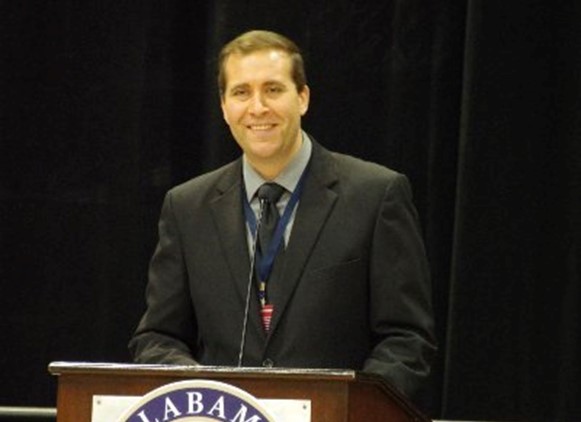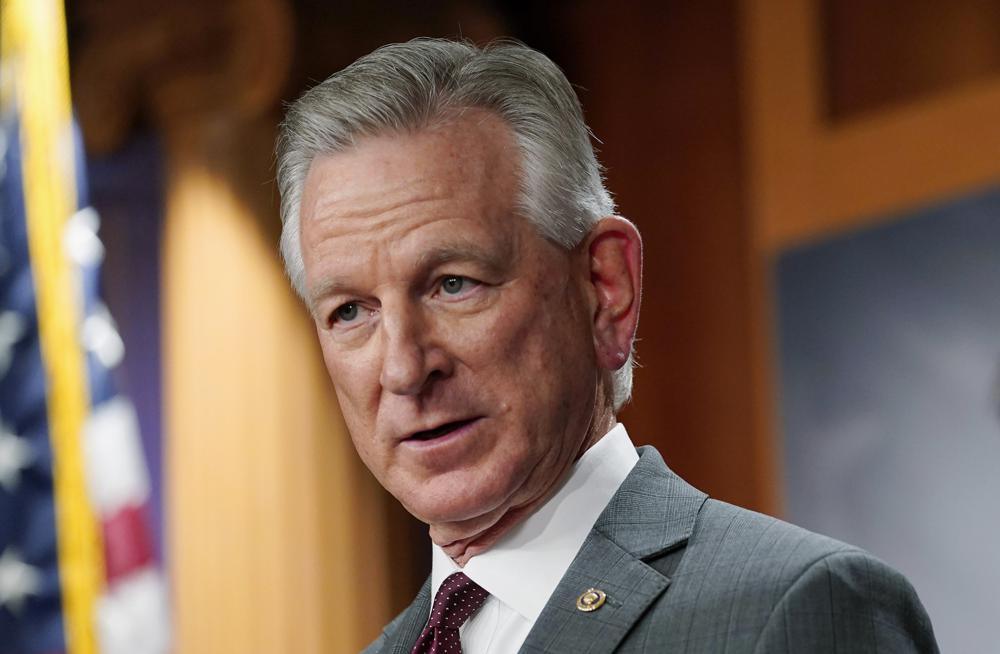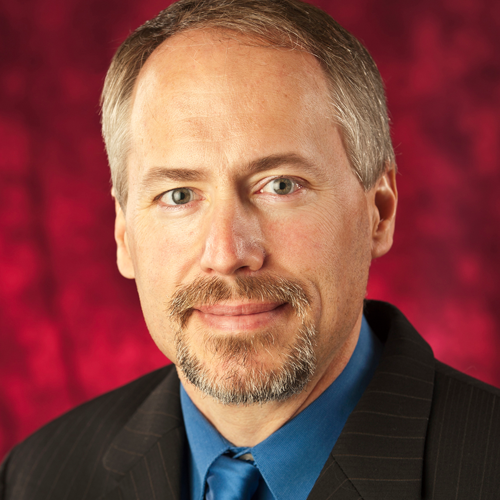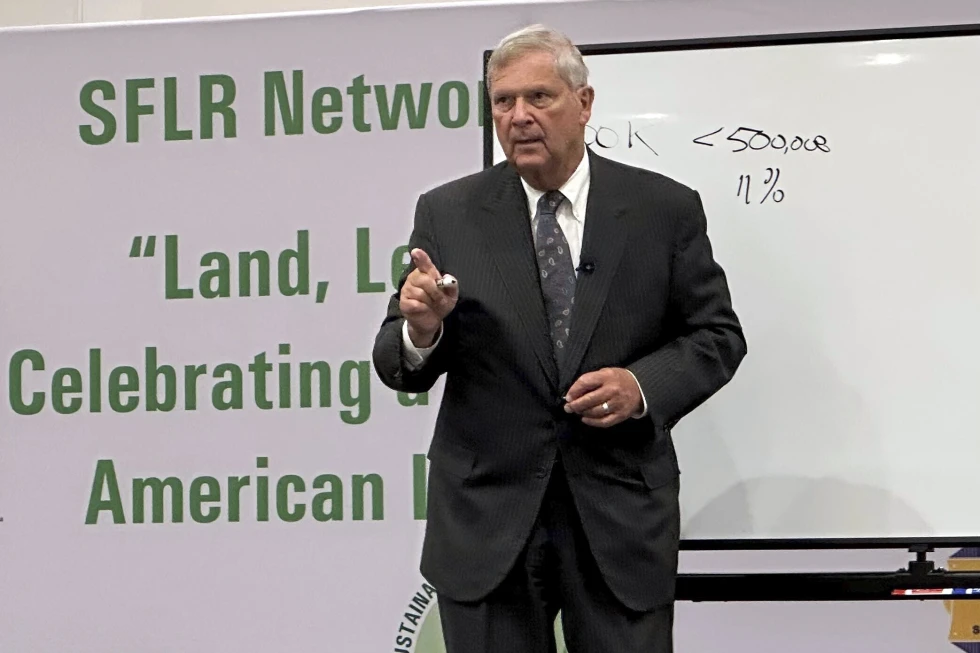ADPH warns Alabamians to protect themselves from mosquitoes

The Alabama Department of Public Health (ADPH) released a statement on Wednesday cautioning the public about how important it is to prevent mosquito bites to protect yourself and your home environment. Two cases of Eastern Equine Encephalitis (EEE) have been diagnosed in humans in Baldwin County this summer. In one of the cases, a little girl was killed. Mosquitoes carry viruses that can cause serious illness or death. Warm and rainy weather means more people get bitten by mosquitoes. “Two cases of Eastern Equine Encephalitis (EEE) in humans have been reported in Baldwin County in the past few weeks, regrettably including one fatality,” Ryan Easterling, a spokesperson for the Alabama Department of Public Health, told Newsweek. Eastern Equine Encephalitis (EEE), while rare, can cause severe illness and death. No vaccine and no specific treatments are available for EEE. ‘Anyone can be infected with EEE, especially if they live, work, or visit areas where EEE is present,” Easterling said. “This virus is concerning, and we are asking the public to take additional precautions to avoid mosquito bites.” ADPH says that preventing mosquito bites is needed to protect against viruses such as EEE and West Nile virus. Both are present in Alabama. Mosquito repellents are particularly needed at the dawn and dusk hours. Municipal mosquito control spraying is needed to prevent new hatches. To avoid mosquito bites:· Use insect repellents.· Clothes protect against mosquito bites. Wear long sleeves and long pants whenever possible.· Wear loose-fitting, light-colored clothes.· Treat clothing with repellents.· Use air conditioning or screens on windows and doors.· Learn about travel-related health risks and recommendations at https://wwwnc.cdc.gov/travel. Mosquitoes tend to lay eggs near standing water. Be sure to empty and scrub, turn over, cover, or throw out any items that hold water on the premises of your property. These include tires, buckets, planters, toys, pools, birdbaths, or trash containers. Tightly cover buckets, cisterns, and rain barrels. · If a container has no lid, cover it with wire mesh with holes. Holes need to be smaller than an adult mosquito.· If you have a septic tank, repair cracks or gaps.· Use larvicides. Go to the ADPH mosquito-borne diseases web page. To connect with the author of this story or to comment, email brandonmreporter@gmail.com.
Republican Presidential Debate set for tonight; Donald Trump not participating

The first Republican presidential debate is on Wednesday at 8:00 pm on Fox News Channel. “The Republican Party is officially kicking off the primary process in Wisconsin with the first debate and ending it in Wisconsin with the convention,” Republican National Committee Chairwoman Ronna Romney McDaniel said on Twitter. “We need every Wisconsin Republican to go to http://BankYourVote.co/gopchair and join the team that will Beat Biden!” Frontrunner former President Donald Trump is not participating. “New CBS POLL, just out, has me leading the field by ‘legendary’ numbers,” Trump said, explaining why he was not participating. “TRUMP 62%, 46 Points above DeSanctimonious (who is crashing like an ailing bird!), Ramaswamy 7%, Pence 5%, Scott 3%, Haley 2%, Sloppy Chris Christie 2%, “Aida” Hutchinson 1%,” Trump wrote. “The public knows who I am & what a successful Presidency I had, with Energy Independence, Strong Borders & Military, Biggest EVER Tax & Regulation Cuts, No Inflation, Strongest Economy in History, & much more. I WILL THEREFORE NOT BE DOING THE DEBATES!” Coming into the debate, polling shows that Florida Governor Ron DeSantis is running in second place, followed by businessman Vivek Ramaswamy. The other candidates on the stage will be U.S. Senator Tim Scott (R-South Carolina), former South Carolina Governor and U.N. Ambassador Nikki Haley, former New Jersey Governor Chris Christie, former Arkansas Governor Asa Hutchinson, North Dakota Governor Doug Burgum, former Vice President Mike Pence. A key issue overshadowing the normal presidential political process is the over 50 indictments against Trump. To this point, the legal controversy has benefited Trump, but will that continue? There are also concerns by some that Trump may not be able to serve if he is found guilty of participating in an insurgency. Trump supporters scoff at assertions that President Trump could be barred constitutionally and dismiss the indictments as Democrats politicizing the legal system. The Madison County Young Republicans are hosting a Republican presidential debate watch party. The debate Starts at 8 pm and ends at 10 pm. The event will be at The Best Pizzeria in Huntsville. The St. Clair County Young Republicans, the Shelby County Young Republicans, and the Greater Birmingham Young Republicans are co-hosting a debate watch party at Hoover Tactical Firearms. The event is from 6:30 – 9:30 pm, and food will be provided. Dues-paying YRs get in for free, $5 tickets for everyone else. The Republican delegates to the Republican National Convention in Milwaukee, Wisconsin, will formally select the GOP nominee. Incumbent President Joe Biden appears to be the Democratic nominee, but he is being challenged by former Congressman Robert Kennedy. At present, President Biden has not agreed to any Democratic presidential debates. The Republican primary season will begin in Iowa in January. The Democratic primary season this year will start in South Carolina. The Alabama presidential primary is on March 5. To connect with the author of this story or to comment, email brandonmreporter@gmail.com.
ALGOP Chairman John Wahl appointed to Committee Overseeing the Republican National Convention

On Tuesday, Alabama Republican Party Chairman John Wahl landed in Milwaukee, Wisconsin, for the Republican National Committee’s Summer Meeting, where he was officially seated on the Republican National Convention’s Committee on Arrangements (COA). The COA is in charge of organizing the 2024 Convention. “I am honored to have been selected to serve on the Convention’s Committee on Arrangements and am excited about the opportunity to represent the State of Alabama at the national level,” Wahl said. “All eyes are going to be on Wednesday’s presidential debate and the convention coming up next year. My goal is to represent Alabama and the Republican Party well as we stand strong for conservative values and fight to take America back from the Democrat Party and their leftist agenda.” The committee will meet as part of a busy week for the Republican Party, including the RNC Summer Meeting and the first GOP Presidential Debate of the 2024 election cycle. The Committee on Arrangements oversees the organization and planning of all aspects of the Convention. Delegates from all 50 states, the District of Columbia, and five U.S. territories will gather in Milwaukee from July 15–18, 2024, to officially select the Party’s nominees for President and Vice President. “I look forward to serving with the other members of the committee, as we put our time and talents together to make sure this historic convention is both memorable and effective,” Wahl said. “It’s time to cut inflation through fiscal responsibility, protect our children from woke policies, and defend the rights and freedoms of every American citizen. I will do all I can to ensure that message is on full display at the 2024 Republican National Convention.” The RNC Summer Meeting runs from Tuesday, August 22, 2023, through Friday, August 25, 2023. Wisconsin is a key swing state that Republicans need to win to hope to retake the presidency in 2024. The Chairwoman of the Republican National Committee, for an unprecedented third term, is Ronna Romney McDaniel. “In the next two years, we look forward to working with the mayor and everyone in the community to make this an event that highlights not just our nominee … but the great city that Milwaukee is,” said RNC Chair McDaniel when the RNC chose Milwaukee to host the Convention. To connect with the author of this story or to comment, email brandonmreporter@gmail.com
Tommy Tuberville joins Republicans urging Defense Department to halt sales of border wall materials

On Tuesday, U.S. Senator Tommy Tuberville (R-Alabama) joined U.S. Sen. Roger Wicker (R-Mississippi), the ranking member of the Senate Armed Services Committee, and all the Republican members of the Senate Armed Services Committee, in a letter to the Department of Defense to halt the sale of border wall construction materials. The letter, addressed to Secretary of Defense Lloyd Austin, was in response to reports that the Defense Department was moving quickly to dispose of the unused border wall materials before the provisions of Wicker’s FINISH It Act could be implemented. “We are deeply disappointed to learn that rather than using construction materials that were purchased to secure the southwest border for that purpose, the Department of Defense has begun auctioning these materials off for other purposes,” the senators wrote. “These auctions represent a brazen attempt to circumvent the FINISH IT Act, which was included in both the House and Senate FY2024 National Defense Authorization Act.” As ranking member of the Armed Services Committee, Wicker worked with Republicans to insert the legislation, which would force the administration to allow the materials to be used to complete sections of the southern border wall, in this year’s National Defense Authorization Act (NDAA). The NDAA passed the Senate with a broad bipartisan majority and the provisions of the FINISH It Act were also included in the House-passed version of the NDAA. However, Congress has not passed the final conference committee version of the NDAA. The Senators believe Austin and the Defense Department are taking the opportunity to auction all the unused border wall materials for scrap metal while Congress is still on its August recess. The Senators are calling to halt further auctions of border wall materials and requesting detailed information on the current sales. The letter calls for the administration to direct the Department of Defense Inspector General to investigate Assistant Secretary of Defense for Homeland Defense and Hemispheric Affairs Melissa Dalton for her failure to provide Congress with accurate and timely information about the use of these border wall construction materials. The Senate Armed Services Committee Republicans have pledged to never consent to a confirmation hearing for the nominee for Under Secretary of Defense for Policy until the senators’ concerns are addressed. The DOD’s combat support branch, the Defense Logistics Agency (DLA), confirmed to reporters with Power Corridor last week that the Pentagon is now moving ahead with the sale of the leftover materials, many of which have been sitting for years in piles on government and private land out West. The items up for auction this week are “excess border wall materials that the U.S. Army Corps of Engineers turned over to the DLA for disposition and are now for sale,” a DLA spokesperson said. Leading the liquidation is Gov Planet, an online auction marketplace run by publicly traded Canadian company Ritchie Bros. Auctioneers. This week, Gov Planet began posting photos on its website and social media of large sections of the unbuilt wall, understood to be worth hundreds of millions of dollars. Sens. Tuberville and Wicker were joined by Sens. Deb Fischer (R-Nebraska), Tom Cotton (R-Arkansas), Mike Rounds (R-South Dakota), Joni Ernst (R-Iowa), Dan Sullivan (R-Alaska), Kevin Cramer (R-North Dakota), Rick Scott (R-Florida), Markwayne Mullin (R-Oklahoma), Ted Budd (R-North Carolina), and Eric Schmitt (R-Missouri). Tuberville stated that he supports common-sense policies that strengthen our border and national security, like building the wall and reinstating the Migrant Protection Protocols, also known as the Remain in Mexico policy. Senator Tuberville has spoken about his concerns on the floor of the U.S. Senate and called on the Biden administration to act. Tuberville has made multiple visits to the southern border to bring attention to the border situation. To connect with the author of this story or to comment, email brandonmreporter@gmail.com.
Steve Flowers: Big Jim Folsom, “Just spell my name right!”

Alabama has never had a more colorful governor than Big Jim Folsom. He also was a brilliant politician who understood the importance of name identification. My ninth-grade civics teacher was Miss Mary Lamb. She had taught school for many years and, in fact, had taught both my mama and daddy in high school. Besides our civics lesson, she would impart wisdom upon us in the way of old sayings. One she particularly liked was, “Fools’ names, fools’ faces, always found in public places.” This one kind of bothered me because I was a budding politician and was already class president. I had learned that one of the first courses of action was to plaster your name all over school. Later in life, I ran for and won election to the Alabama legislature. Every time we would go out to put up campaign signs, I would cringe when I thought about Miss Lamb’s admonition. However, as a student of politics, I knew that name identification was essential. You cannot expect a voter to vote for you if they have not even heard of you. One of the best stories I know on Big Jim Folsom focused on his belief in the importance of name identification. Big Jim’s first term had broken the moneyed interests’ stronghold on the governor’s office. But the big city dailies and the legislators were still controlled by the Big Mules of Birmingham and the Big Planters of the Black Belt. They hated Big Jim’s folksiness. The big dailies like the Birmingham News, Montgomery Advertiser, and Mobile Press Register would poke fun at Big Jim and try to discover a scandal on a daily basis. The legislature constantly tried to impeach him. One of the papers, after days of digging, felt they had another patented scandal to reveal on Folsom. They called to tell him that they had an expose on his administration and, out of courtesy, wanted to get his side of the story. Now Big Jim could not care less what the big city press said about him. They had written the harshest things about Folsom that could ever be written. It had not affected him one bit with his loyal rural friends and constituents, so it is not surprising that Big Jim treated the big city press with contempt and disdain. When they called, he said, “Boys, come on down and see Big Jim and tell me what you got on me today. I haven’t seen y’all in a week or two. Come on down right now.” When they got down to the office, he greeted them with his shoes off and his bare feet resting on his desk, reared back in his chair, with a grin on his face. He said, “Boys, hit me with your best shot. What y’all got on ole Jim?” They said, “Governor, this is no laughing matter. We have a list here of 37 people who you hired over in the Highway Department and circumvented the merit system to put them on the state payroll.” Big Jim laughed and glanced at their list and said, “You lying daily newspapers, you lying about Big Jim again, lying, lying, lying. I got a new list right here, and I haven’t hired 37 people. I’ve hired 72, and the only merit they got is that they’re Big Jim’s friends.” The reporters were incredulous. They said, “Governor, we are going to put that in the paper tomorrow.” Big Jim smiled and said, “Boys, I don’t care what you write about me, just spell my name right!” Big Jim knew the cardinal rule of name identification. The saying is now famous among Alabama politicians, “Just spell my name right.” Big Jim coined it. Even though Big Jim was fully vetted by the big city dailies on an almost daily basis, he was governor in an era where there was no ethics law and no overt political prosecution, unlike today. Big Jim was known as the “little man’s big friend.” His campaign song was “Y’all Come.” I hope you have enjoyed this five-part series on Big Jim Folsom. See you next week. Steve Flowers is Alabama’s leading political columnist. His weekly column appears in over 60 Alabama newspapers. He served 16 years in the state legislature. Steve may be reached at www.steveflowers.us.
Daniel Sutter: Taylor Swift and the Coase Theorem

The first North American portion of Taylor Swift’s Eras Tour has wrapped up. Ms. Swift structured ticket sales to help her biggest fans, as opposed to her richest fans, attend. Economics’ famous Coase Theorem suggests that this was not possible. Several steps altered the distribution of tickets. First, the prices of tickets were set (relatively) low, an average of about $200. Second, Ticketmaster could not send tickets directly to the secondary market, where prices are set by supply and demand. Finally, fans got codes for a presale, which crashed the Ticketmaster website last November. These steps should have helped Swifties of modest means get seats. Many more fans can pay $100 than $1,000 for a ticket. But who attended? The Coase Theorem addresses this. Nobel Prize winner Ronald Coase argued that scarce resources and valuable property go to those willing to pay the most regardless of initial ownership. Economic efficiency is based on “willing to pay the most,” so the theorem claims that we have efficient use regardless of initial ownership. The Coase Theorem implies that Ms. Swift could not get her biggest fans into the Eras Tour. Why? With normal Ticket Master practices, high secondary market prices would price0 many fans out. But Coase’s argument suggests that rich fans would buy tickets from the big fans getting presale tickets. Ms. Swift’s measures still would benefit her fans. The Theorem says that initial ownership affects who benefits, not who attends. Loyal fans reselling their $100 for $1,000 would profit, as opposed to Ticket Master or Ms. Swift. The Coase Theorem applies broadly. Many baseball fans think that free agency and no salary cap let big market teams buy the best players. But prior to free agency, big market teams could buy players from small market teams; the Yankees’ historic dominance was mostly before free agency. Free agency lets players benefit, not teams. Like all economic results, the Coase Theorem holds only under certain conditions. For one, those willing to pay the most must find ticket holders and make them offers. Transaction costs, the costs of negotiating and carrying out trades, include the cost of finding the ticket holders. We do not live in a zero-transaction cost world, so the Coase Theorem will not hold perfectly. Many parents might recognize a second condition. Parents might pay $100 or $200 face value to take their kids but not secondary market prices. More importantly, even though they would not buy tickets at secondary market prices, they would not sell $100 tickets for $1,000. Owners can keep their property regardless of how much others might offer them. The amount you must be paid to sell your property is called willingness to accept. In many instances, a person’s willingness to accept considerably exceeds their willingness to pay. The Coase Theorem does not hold with a disparity between these values. Competition also limits Ms. Swift’s ability to help her fans. We saw this during the presale when millions tried purchasing tickets. Ticket brokers competed with fans to get tickets. Such efforts are inevitable when something worth $1,000 sells for $100. Competition is hardly new. If Ms. Swift was touring back when tickets were sold at the box office, fans would have lined up to purchase them. Fans likely would have camped out. The hours (or days) spent camping in the heat (or cold) would have offset part of the value of an inexpensive ticket. And some unlucky fan would have been next in line when the concert sold out. Competition is a fundamental element of human society, biologists might say of life. Our effort to get nice things cheap dissipates the benefits. The best we can do is limit the extent of this competition. Determining how many fans of modest means went to the Eras Tour would be an interesting economic case study. The tour, which continues into 2024, is expected to generate $2 billion in ticket revenue. Regardless of exactly how many tickets were resold, Ms. Swift benefited her fans by foregoing even more revenue from higher ticket prices. Daniel Sutter is the Charles G. Koch Professor of Economics with the Manuel H. Johnson Center for Political Economy at Troy University and host of Econversations on TrojanVision. The opinions expressed in this column are the author’s and do not necessarily reflect the views of Troy University.
Biden administration spending $150M to help small forest owners benefit from selling carbon credits

The Biden administration said Tuesday it will spend $150 million to help owners of small parcels of forestland partner with companies willing to pay them for carbon offsets and other environmental credits. Agriculture Secretary Tom Vilsack announced the grant program at a conference of Black landowners in coastal Georgia, saying programs that allow private companies to offset their own emissions by paying to protect trees have disproportionately benefited owners of large acreage. “In order for those small, privately held forest owners to be able to do what they need and want to do requires a bit of technical help,” Vilsack told about 150 conference attendees in a church ballroom in Brunswick. “And sometimes that technical help is not easy to find. And it’s certainly not easy to afford.” The grant money comes from the sweeping climate law passed by Congress just over a year ago, and targets underserved landowners, including military veterans and new farmers, as well as families owning 2,500 acres (1,011 hectares) or less. The goal is to protect more tracts of U.S. forest to help fight climate change. The past decade has seen a rapidly expanding market in which companies pay landowners to grow or conserve trees, which absorb carbon from the atmosphere, to counterbalance their own carbon emissions. For owners of smaller family tracts, selling carbon offsets or other credits would give them an alternative income to harvesting their timber or selling their property to a developer. Companies are pouring billions of dollars into environmental credits, but small landowners face daunting barriers to eligibility, said Rita Hite, president and CEO of the American Forest Foundation. To participate, owners need to take an inventory of their forested property, have a land management plan, and run models to calculate the land’s carbon value. “Previously, if you didn’t have 5,000 acres or more, you weren’t participating in these markets,” Hite said. “Not only are there technical hurdles, but also financing hurdles.” The American Forest Foundation and the Nature Conservancy launched a joint program four years ago that covers many of the costs for family land owners to sell carbon offsets for their land. Those groups and other nonprofits will be eligible to apply for grants of up to $25 million to provide direct help to landowners under the Biden administration’s program. So will state forestry agencies, university agricultural extension services and others The money could pay professionals to help owners develop land management plans or to connect them with project managers who serve as middlemen between owners and companies seeking environmental credits. The grants were welcomed by John Littles, a leader of the Sustainable Forestry and African American Land Retention Network hosting the Georgia conference. The group represents 1,600 Black landowners across eight Southern states — Alabama, Arkansas, Georgia, Mississippi, North Carolina, South Carolina, Texas, and Virginia. “Most of the time, we’re left out — more specifically, people of color,” Littles said. “We’re not afforded the opportunity to help design the programs, so the programs are mainly now designed for large landholdings and large acreage.” Littles said his network plans to apply for a grant under the new program. But he’s not sure how much demand there will be from landowners. He said that will largely depend on whether owners of smaller acreages can get enough money from conservation credits. “I think it’s still early to tell,” Littles said. “But it has to be a benefit for the landowners.” Hite of the American Forest Foundation said landowners with small acreage shouldn’t expect big profits from selling environmental credits. She said owners enrolled in the group’s Family Forest Carbon Program earn on average about $10 per acre in a year. “Is this going to matter for a 30-acre landowner? It’s not going to make them rich,” Hite said. “But it will probably pay the taxes.” Republished with the permission of The Associated Press.
Citing appeals court, Georgia asks judge to reinstate ban on hormone therapy for transgender minors

Citing a recent ruling affecting Alabama, Georgia officials asked a federal judge Tuesday to allow the state to resume enforcement of its restriction on hormone therapy for transgender people under the age of 18. Judge Sarah Geraghty should vacate her order blocking Georgia’s hormone therapy ban because an appeals court allowed enforcement of a similar Alabama law, attorneys for the state of Georgia said in a court filing. A three-judge panel of the 11th U.S. Circuit Court of Appeals ruled Monday that Alabama can implement a ban on the use of puberty blockers and hormones to treat transgender children. It vacated a judge’s temporary injunction against that law. The 11th Circuit includes Georgia. Its ruling came a day after Geraghty issued a preliminary injunction blocking Georgia’s hormone therapy restriction. “In its opinion, the Eleventh Circuit expressly addressed — and rejected — each of the core legal theories plaintiffs here advanced in support of their motion for preliminary injunction,” attorneys for Georgia said in their court filing. Groups representing the plaintiffs in Georgia’s case did not immediately have comment. The Georgia law, Senate Bill 140, allows doctors to prescribe puberty-blocking medications, and it allows minors who are already receiving hormone therapy to continue. But it bans any new patients under 18 from starting hormone therapy. It also bans most gender-affirming surgeries for transgender people under 18. It took effect on July 1. In her ruling, Geraghty said the transgender children who sought the injunction faced “imminent risks” from the ban on starting hormone therapy, including depression, anxiety, disordered eating, self-harm, and suicidal ideation. She said those risks outweighed any harm to the state from an injunction. The 11th Circuit judges who ruled on Alabama’s law said states have “a compelling interest in protecting children from drugs, particularly those for which there is uncertainty regarding benefits, recent surges in use, and irreversible effects.” Doctors typically guide children toward therapy or voice coaching long before medical intervention. At that point, puberty blockers and other hormone treatments are far more common than surgery. They have been available in the U.S. for more than a decade and are standard treatments backed by major doctors’ organizations, including the American Medical Association. At least 22 states have now enacted laws restricting or banning gender-affirming medical care for transgender minors, and most of those states face lawsuits. Republished with the permission of The Associated Press.


